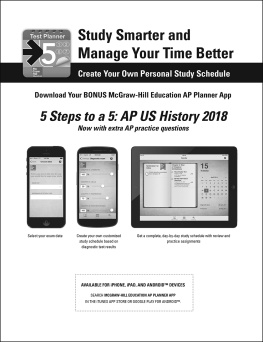Contents
- Alternative Traditions of Knowledge Before the Scientific
Revolution
Guide
Page List



Copyright 2017 by McGraw-Hill Education LLC. All rights reserved. Except as permitted under the United States Copyright Act of 1976, no part of this publication may be reproduced or distributed in any form or by any means, or stored in a database or retrieval system, without the prior written permission of the publisher.
ISBN: 978-1-25-986316-5
MHID: 1-25-986316-6.
The material in this eBook also appears in the print version of this title: ISBN: 978-1-25-986315-8, MHID: 1-25-986315-8.
eBook conversion by codeMantra
Version 1.0
All trademarks are trademarks of their respective owners. Rather than put a trademark symbol after every occurrence of a trademarked name, we use names in an editorial fashion only, and to the benefit of the trademark owner, with no intention of infringement of the trademark. Where such designations appear in this book, they have been printed with initial caps.
McGraw-Hill Education eBooks are available at special quantity discounts to use as premiums and sales promotions or for use in corporate training programs. To contact a representative, please visit the Contact Us page at www.mhprofessional.com.
Trademarks: McGraw-Hill Education, the McGraw-Hill Education logo, 5 Steps to a 5, and related trade dress are trademarks or registered trademarks of McGraw-Hill Education and/or its affiliates in the United States and other countries and may not be used without written permission. All other trademarks are the property of their respective owners. McGraw-Hill Education is not associated with any product or vendor mentioned in this book.
AP, Advanced Placement Program, and College Board are registered trademarks of the College Board, which was not involved in the production of, and does not endorse, this product.
The series editor was Grace Freedson, and the project editor was Del Franz.
Series design by Jane Tenenbaum.
TERMS OF USE
This is a copyrighted work and McGraw-Hill Education and its licensors reserve all rights in and to the work. Use of this work is subject to these terms. Except as permitted under the Copyright Act of 1976 and the right to store and retrieve one copy of the work, you may not decompile, disassemble, reverse engineer, reproduce, modify, create derivative works based upon, transmit, distribute, disseminate, sell, publish or sublicense the work or any part of it without McGraw-Hill Educations prior consent. You may use the work for your own noncommercial and personal use; any other use of the work is strictly prohibited. Your right to use the work may be terminated if you fail to comply with these terms.
THE WORK IS PROVIDED AS IS. McGRAW-HILL EDUCATION AND ITS LICENSORS MAKE NO GUARANTEES OR WARRANTIES AS TO THE ACCURACY, ADEQUACY OR COMPLETENESS OF OR RESULTS TO BE OBTAINED FROM USING THE WORK, INCLUDING ANY INFORMATION THAT CAN BE ACCESSED THROUGH THE WORK VIA HYPERLINK OR OTHERWISE, AND EXPRESSLY DISCLAIM ANY WARRANTY, EXPRESS OR IMPLIED, INCLUDING BUT NOT LIMITED TO IMPLIED WARRANTIES OF MERCHANTABILITY OR FITNESS FOR A PARTICULAR PURPOSE. McGraw-Hill Education and its licensors do not warrant or guarantee that the functions contained in the work will meet your requirements or that its operation will be uninterrupted or error free. Neither McGraw-Hill Education nor its licensors shall be liable to you or anyone else for any inaccuracy, error or omission, regardless of cause, in the work or for any damages resulting therefrom. McGraw-Hill Education has no responsibility for the content of any information accessed through the work. Under no circumstances shall McGraw-Hill Education and/or its licensors be liable for any indirect, incidental, special, punitive, consequential or similar damages that result from the use of or inability to use the work, even if any of them has been advised of the possibility of such damages. This limitation of liability shall apply to any claim or cause whatsoever whether such claim or cause arises in contract, tort or otherwise.
CONTENTS
PREFACE
Welcome to the world of Advanced Placement (AP) European History. Whether you are, or have been, enrolled in an AP European History course at your school or are preparing on your own, this guide will help you to move smoothly and confidently from your individual starting point through a five-step process that will bring you the level of preparation you desire. Along the way, you will be evaluating your current level of preparation, evaluating your learning strategies, reading widely, analyzing primary documents, taking practice multiple-choice tests, and writing practice essays. As you go, you will be developing the strategies and confidence you need to score a 5 on the AP European History Exam.
The five-step process is described in detail in the Introduction. Here, I simply want to urge you to enter into your preparation with enthusiasm. The intricate story of European history is dramatic, fascinating, and extremely relevant to the world in which you live. The information, understanding, and skills that you will learn by working through this guide will help you to do well on the AP European History Exam, but they will also help you to excel in college and to become a well-informed, critically thinking human being.
As you begin, it is important that you not think of this guide as some large book to get through. This guide is a tool and, like many tools, it can be used in a number of different ways. You can follow it through from beginning to end, or you can jump around, using the information and exercises contained in it in any way that suits you best. So take some time to familiarize yourself with the contents of this guide; get a feel for how it works. Then, when you are ready, read ; they will help you to choose the mode of preparation that is right for you.
Good luck, and enjoy your journey!
ACKNOWLEDGMENTS
I would like to thank Eric Dodge for putting me in touch with Grace Freedson, and Grace Freedson for connecting me with McGraw-Hill Education. I would also like to thank all those who assisted me in the preparation of this book: Del Franz for superior editing, Robyn Ryle for her critical reading and support, and my daughter, Grace Brautigam, for her patience.
JB
Many thanks to Grace Freedson for putting us in touch with McGraw-Hill Education and to Del Franz for superb editing. We would also like to thank the anonymous outside evaluators for their invaluable guidance.
BBS
WP
ABOUT THE AUTHORS
Jeffrey Brautigam is Professor of History and Division Coordinator for the Humanities at Hanover College in Hanover, Indiana, where he evaluates all requests for AP college credit and placement in history. A recipient of a PhD in history from the University of Florida, he has taught European history at the college level for 20 years. The coauthor of A Student Introduction to Charles Darwin (Kendall/Hunt, 1999, ISBN 0-7872-6311-7), Professor Brautigam is a historian who writes for students and general audiences.
Beth Bartolini-Salimbeni holds degrees in history, Spanish, Italian, and comparative literature. A former Fulbright scholar and twice a National Endowment for the Humanities (NEH) fellow, she has taught AP World History, AP European History, and AP Art History at the high school level as well as history and languages at the high school and university levels, both in the United States and in Italy.





